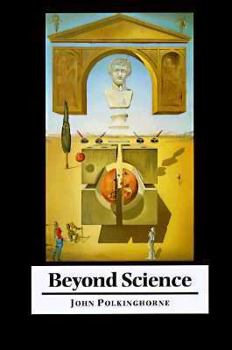Beyond Science: The Wider Human Context
Select Format
Select Condition 
Book Overview
John Polkinghorne has had a distinguished career as a particle physicist and as an author of books exploring themes in science and religion. In Beyond Science Polkinghorne examines the nature of... This description may be from another edition of this product.
Format:Hardcover
Language:English
ISBN:0521572126
ISBN13:9780521572125
Release Date:August 1996
Publisher:Cambridge University Press
Length:143 Pages
Weight:0.85 lbs.
Dimensions:0.7" x 6.3" x 9.3"
Customer Reviews
2 ratings
An excellent science writer with intriguing ideas.
Published by Thriftbooks.com User , 26 years ago
Polkinghorne is a splendid writer of science and a formidable mind with wonderful ideas. He has a control of language rivaling any science writer I have read. His "Quantum World" is a beautiful work. In "Beyond Science" he continues along similar lines with a particularly charming chapter discussing the personalities of great physicists with whom he has associated. He does a superb job describing what science is and how it works. Unfortunately he descends into scholarly ambiguity in his chapter on the human mind, with bloated sentences that run on and can easily confuse even the careful reader. The ultimate purpose of the book is to present allowance for belief in a divine creator. Mostly this revolves around the Anthropic Principle (AP) - the idea that the existence of life is so sensitive to variation in physical constants of the universe that they must have been set by a creator for such life to exist. AP embraces evolution as the machinery for God's work. Polkinghorne is in a minority among physicists but the idea should cause some pause for reflection. He limits credit to the idea that since we are products of those constants it should not be surprising that they are what they are. As one who appreciates the power of science he understandably holds dear any notion based on reason that allows for God. But he appears to hold the idea too dearly, as adherents of AP often do. Attempting to make apparent improbabilities of constants set by chance understandable he notes Leslie's philosophical story of a fly hit by a bullet on a vast wall. He allows it two possible reasons for occurring, 1) because very many bullets were fired or 2) because a marksman took careful aim. Thus with intent, as a creator would have for tuning the constants with the aim of creating humans. Surely he knows but ignores two other possibilities, that the fly and bullet just happened to be at the same place in time or that the fly and bullet have some as yet undiscovered attraction for one another requiring they meet. This last is analogous to the constants having the values they do for as yet undiscovered requirements within the fabric of the Big Bang or Inflation or some other mechanism. Probabilities against events can sometimes carry too much weight. The probability that any four hands of thirteen cards are drawn in specific order from a deck of fifty-two is 1 in 4 billion trillion. Yet each time you draw four hands of thirteen cards, it happens. The cards dealt are completely determined by their position in the deck. We don't know what that is but it is fixed. Polkinghorne makes a few similar, but generally lesser transgressions to preserve his belief. I was repeatedly surprised and relieved to see him admit this on occasion and discuss opposing views.The only unfortunate result of such a book will be that creationists use such material against science through misunderstanding and convenient abbreviation. Which is not a reason to stop such inquiry. I recommend "Beyond S
Simple, but profound, thinking about science and religion
Published by Thriftbooks.com User , 27 years ago
Polkinghorne had a career as an academic physicist, and has also been theologically trained. He examines science from a religious viewpoint. He doesn't find a warfare between science and Christianity, but he does believe that scientists sometimes claim to know more than they should about metaphysical issues. Polkinghorne deals intelligently with both physics and biology. One chapter gives capsule evaluations of the legacies of important scientists, including Stephen Hawking. This book does not claim that the earth was created a few thousand years ago, but it does claim that science has by no means ruled out an Intelligent Designer.






